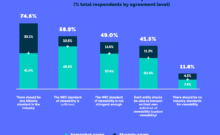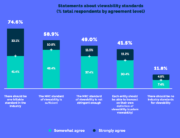Brands have been sounding a steady drumbeat for more transparency in digital advertising for a while. Now that the programmatic ecosystem is starting to shine the light on itself, the sights revealed tend to be displeasing more often than anyone would like. This current push toward greater transparency makes 2018 an opportune time for the industry linchpins, the advertiser and the publisher, to do something about the ad-tech tax.
From data gathered from industry sources, eMarketer recently reported that, in 2017, around 55 percent of client budgets allocated for programmatic ad spend went toward paying the ad tech supply chain, one that is crowded with a large number of players, many that add very little value to transactions. This covers the range of data and tech services from targeting and trading to verification for digital ad placements. When you tack on the additional 5 percent that agencies typically get for their roles in programmatic transactions, publishers only took in 40 percent of the deal. Not too long ago, The Guardian reported as little as a 30 percent cut.
It’s important to keep in mind that this 55 percent tax is applied to the relatively smaller portion of market share that isn’t already consumed by the walled garden platforms like Facebook and Google. This means an uphill climb for publishers to monetize. They feel forced to sell more ads than they would like, and the law of diminishing returns sets in as too many ads—many of them of dubious quality—on publisher pages annoys consumers, who tune out, install ad blockers or, worse yet, flee the offending site(s) altogether.
The ad-tech tax can only be abused if both sellers and buyers allow a veil of secrecy to reign over the marketplace.
Whether you are a Fortune 50 multinational brand or a digital-first upstart, you are not going to be happy that more than half of your media budget is going to middlemen. You want this spend working for you directly, not for the middlemen and their investors. Certainly, some do add value and actually make media spend work harder, but many others offer nothing more than ad-tech snake oil. While we can blame the avarice of venture capitalists for the gold rush of sketchy companies with limited value for creating a mysterious and confusing landscape, the advertiser and the publisher still hold the cards.
Read More at The Original Article: www.adweek.com









